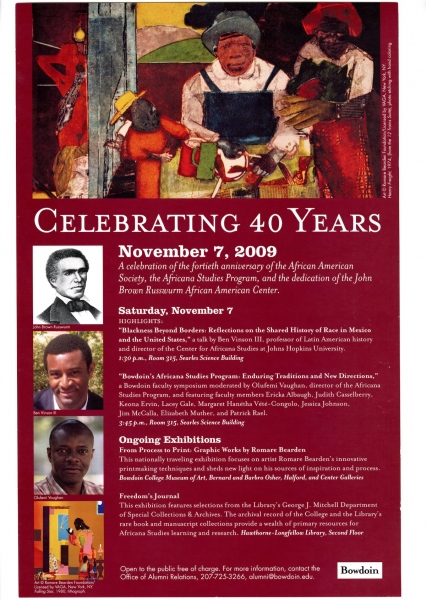For nearly forty years, the College failed to sustain more than one full-time appointment in Africana Studies, which had immense implications for students’ ability to complete the major, the available mentorship for black students, and on the advisorship of the African American Society. Randy Stakeman was the final professor to maintain all of these roles at once, in addition to serving as associate dean of the faculty and overseer of Bowdoin’s Mellon Mays program. Upon Stakeman’s retirement in 2006, President Barry Mills determined to focus the College’s recently-launched capital campaign, at least partly, on raising funds to establish four additional Africana Studies professorships. Due in part to this investment, the program is stronger than it has ever been. With the celebration of the program’s 50th anniversary, it is important to remember that this strength is both recent and long-fought-for—not just in these fifty years, but in Bowdoin’s longer history of racism and slow change.
Reflections at 40
Under President Barry Mills, the College diversified rapidly. By 2008, students of color made up 30 percent of the student body. Mills also promised program director Randy Stakeman that he would commit the College to expanding the Africana Studies faculty—until his retirement in 2006, Stakeman held what was still the only full-time appointment in the program. Mills ultimately opened up faculty lines for four new professors in the program. At the 40th anniversary celebration, Mills commented on Bowdoin’s increased diversity and the future of diversity at the College: “Now, I know that many of you have doubted, for good reason, this College’s sincerity, intentions, and goodwill. And, candidly, some of you have doubted yourselves and whether the commitment to the College was worth it. Some of you have doubted me and whether my commitment is genuine and lasting. To you I say: get committed to Bowdoin and stay committed to Bowdoin because these last nine years at the College are not a ‘one-time-wonder.’ Get committed because this is our legacy as we seek to change Bowdoin forever. What we do today is in the bones of this place.”
